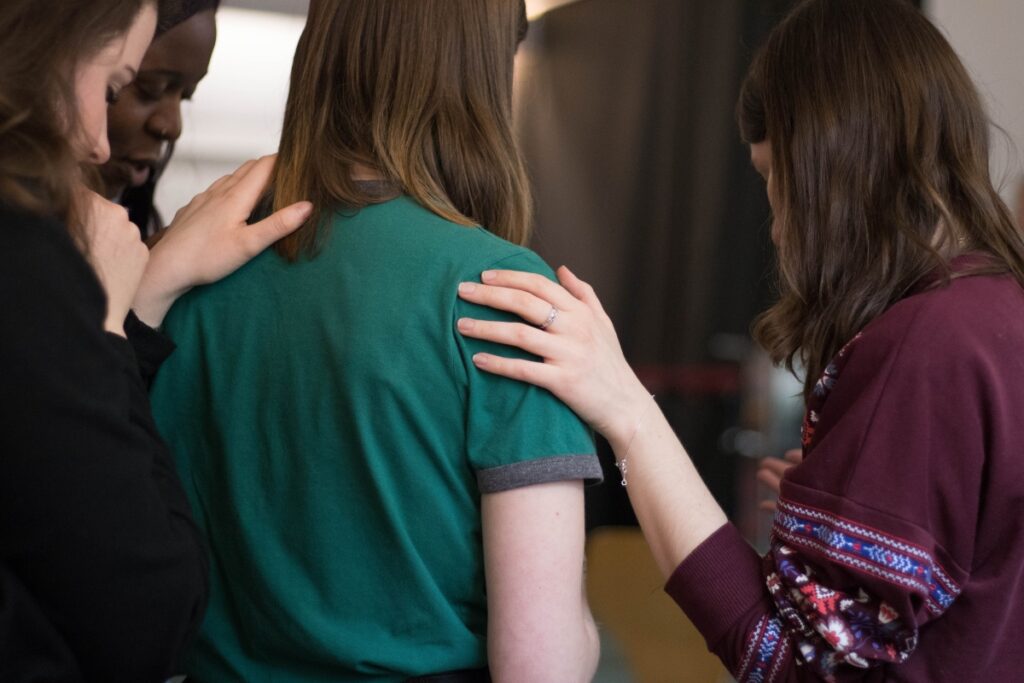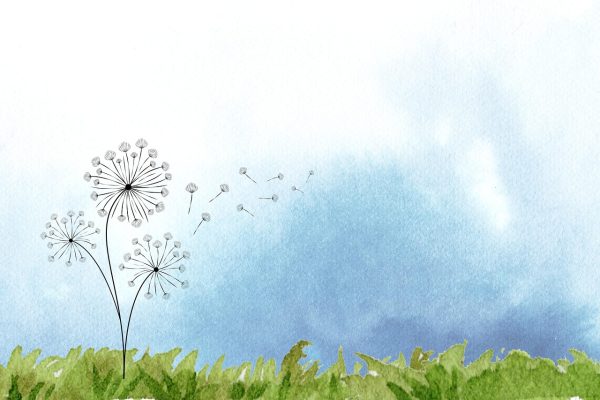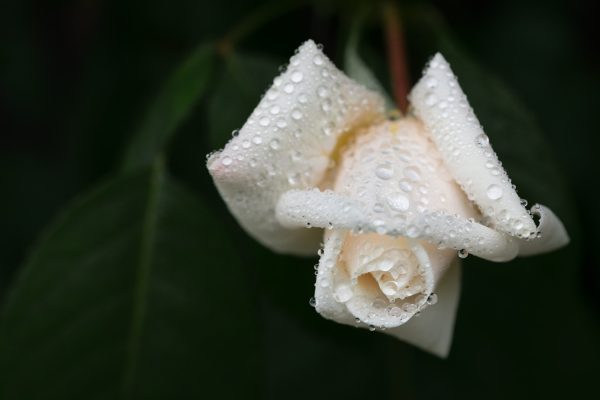This ritual of grieving may be performed on 11 Heshvan, the date of mourning for the death of Rachel and an occasion for mourning the exile of the Shekhinah and the loss of the feminine. Alternatively, this ritual may be performed on the winter solstice, which according to medieval Jewish tradition is the date on which Jephthah’s daughter died.
The Book of Judges recounts the history of the Israelite people after settling in the promised land, as the tribes struggle against neighboring peoples such as the Canaanites and the Perizzites, the Ammonites and the Moabites.
The story of Jephthah’s Daughter (Judges 11) tells us that Jephthah the Gileadite made a vow to the Lord before going into battle with the Ammonites. He vowed that if he succeeded in battle he would offer up to the Lord as a burnt offering whatever first came forth from his doors of his house to meet him. When his daughter (who is unnamed in the text) comes out with timbrels and dances to greet him, he rends his clothes, saying that she has brought him very low and troubled him, but that a vow to God cannot be retracted. She does not protest, but obtains permission to spend two months in the mountains with her companions, to bewail her virginity. When she returns, Jephthah fulfills his vow. An epilogue tells us that it was a custom for the daughters of Israel to lament her death for four days each year. This is the earliest example in recorded history of the fact of women gathered together in an annual ceremony.
Jephthah’s Daughter: A Lament is a ceremony which offers an opportunity to grieve the sacrifice of Jephthah’s daughter, and to ponder the meaning of her sacrifice to us today. What is it that we mourn? How are we to transform mourning into joy? Groups of performers are invited to experiment with the text. A group may choose to read or perform the entire Lament, or it may select sections.
JEPHTHAH’S DAUGHTER: A LAMENT
And it came to pass at the end of two months, that she returned unto her father, who did with her according to the vow which he had vowed; and she had not known man.
And it was a custom in Israel, that the daughters of Israel went yearly to lament the daughter of Jephthah the Gileadite four days in a year.
– Judges 11:38-39
(Performers come onstage to this chant, which may be repeated between sections of the performance.)
Going forth in mourning
Returning in joy
Going forth in mourning
Returning in joy
Going forth in mourning
Returning in joy
Mountaintop
(The chorus is motionless. Two voices read, the italicized voice interrupting.)
Sacrifice: The act of offering something to a deity in propitiation or homage, esp. the ritual slaughter of an animal or person. A victim offered in this way. The forfeiture of something highly valued for the sake of one considered to have a greater value or claim.
The heart asks pleasure first. Let him kiss me with the kisses of his mouth. And then excuse from pain. And then–
Considered to have a greater, as they say, value or claim. A grander. A greedier. Such as a father. Such as a vow. A sequence of special higher-than-legal-more-sublime. Words. Such as a father might utter to One. The relinquishment of something at less than its presumed value. Something so relinquished. Such as a daughter. A loss so sustained. The father has. Lost the daughter.
The father has sacrificed the daughter.
He has–
we have– beloved one blessed are
lost her.
Holocaust: Great or total destruction, especially by fire. Widespread destruction. Disaster (bad stars). A sacrificial offering that is entirely consumed by flames. Cf. Holkaustos, burnt whole.
Sacer, sacred + facere, to make. It is made sacred by sacrificing it.
Sunrise: We Emerge from the Forest into a Clearing
(Full chorus, almost dancelike, but uppercase is shouted)
Into a clearing
from the forest of our lives
every year it is
a wild high climb
The presence of God
is in the rocky ridge
the ghostly wind the stunted pines
the wildflowers
Light stands on the mountain
almost too bright
like a truth from which
we hide our eyes
Today we do not remember
the angel, the ram, the thicket
today we remember the war
and the death of our sister
(Sopranos alone)
The sons of Ammon were coming
we feared their army
we begged Jephthah
be our leader
The spirit of God was upon him
he made a great slaughter
when he returned home he was
greeted by his daughter
For he had one daughter, no other
to praise him after the war
so the child danced out with timbrels
and with dancing from the door
But Jephthah rent his clothes he said
you have brought me very low
if a man open his mouth to God
he must fulfill his vow
Then the child asked leave to go
two months in the mountains
to bewail her virginity
among her companions.
Two months in the mountains.
(All) AND JEPHTHAH HOME FROM SLAUGHTER
WAS GREETED BY HIS DAUGHTER!
Little Fugue
(A section for several voices: A begins loudly then continues softly under the voice of B, who speaks her section twice, then yields to C, who speaks very quickly, etc. Variations can be tried; in any case the overall effect should be one of cacophony, but each voice should be heard clearly at least once. The final section is to be said in unison by all speakers. The duration of this piece should be no longer than one minute.)
A. She weeps in the night
her tears are on her cheek
my eye, my eye runs down with water
because the comforter is far from me
B. The Lord is become an enemy
he has swallowed up Israel (2x)
C. He actually blames her claims she
made him compelled
do to her this awful thing
can you believe
never otherwise
lament
D. Fault stands in door fault fault
fist is his whoever cries be hit (2x)
E. Obedience shallow law
repeat repeat a tale of terror repeat
comply complain
complain comply
deny deny
All: Want to say no
want to jump in
want to say stop
stop stop
want to stop
being afraid, want
the power
to say no
Interrogation and Reply
(The implicit question asked by this section is what keeps someone in an apparently oppressive or abusive situation when the option of walking out seems possible. The question has many resonances, including the issue of the feminist within a patriarchal religion, and the issue of God in a post-holocaust age. The structure of the piece is modelled on the alphabetical acrostics of the Book of Lamentation)
In the beginning, the wound is invisible.
–Edmund Jabes
A question to pose to the celebrants. The participants. You women, of outraged eyes and grinding teeth, resemble birds whipping themselves against the walls of a room into which they have accidentally flown. In its frustrated attempts to escape a bird becomes frenzied. It leaves bloodspots on the walls. But here no walls exist. Against what do you fling yourselves so extravagantly?
–Against this very question, hurling ourselves at it in vain. This irresistable, unanswerable question encloses us like the swaddling blanket around the squirming infant. Like a Polish chimney. Like a used star. Like a crown and a balloon. Like a glass bell jar.
–Because walls of stone or plaster would include windows from which to climb, doors to unlock, keyholes to squint through, we are not permitted images. Instead, we inhabit a penitentiary of alphabetical fire, which is a cage of cages.
–Chained to earth from before the beginning of the world, the destiny of the human heart is to ache. We alone offer it the exalted thin wind of the mountaintop.
–Do you think you are immortal? Do you think you are innocent? We will die but we cannot abandon our sister. Do you claim we are extravagant? Do you believe we are strident? Have you heard that if you save one life it is as if you saved the universe? Down the collapsed mineshaft of time we call until our voices grow hoarse, we are coming though we delay. We beg our sister to breathe, to forgive our slow machinery.
–Expert at stillness, we are whirling in place like Sufis. We are dancing on the inflamed heart. As it heaves we almost fall.
–From the forest of our lives
into the clearing
lightning rapes the mountaintop
violent like the truths
of which we only dream
forgetting
the ancient screaming of God
answers our scream
–God who is One warns us that to escape is to perish. Beyond these nonexistent walls they have removed the air! Did you not know that? Nothing is outside but vipers and tigers.
–Her desire was for her beloved. Her boyfriends, her girlfriends, her life.
–If a baby is beaten by a parent, and then put down on the floor, the baby will crawl, not away from the parent, but toward. So we– So we–
–Just then I stood in the doorway of a ruined stone castle. A tuft of thick grass lay beneath my feet. The Mediterranean sun hammered against my forehead until it felt like a brass amphora. I offered my brass forehead as a bride. Here, I said, is the soul. Before me tumbled the hillside of grass and boulders to the sea edge. The blue sheerness offered itself as a husband.
–Killing God, killing God….if I walk away God will complete suicide. He threatens it. I cannot risk it.
–Lovely little lies. The truth is that we are afraid of our passions. And afraid of history.
–More lies. The truth is that we are terribly, passionately hopeful. The truth is that we are tethered like fiery-eyed horses. The truth is a mystery. The truth is, it is a mystery. The truth is that the razor is in my pocket.
–No, the truth is that we are on vacation. Lament, for us, is recreational. A pilgrimage is an excuse for adventure, look at Chaucer, look around, women in every culture pursue some religious rites or other, groveling massively, doing novenas, wearing veils, lighting candles, you must perceive that this is not simply a matter of oppression. Of course they are oppressed. Of course we are. The ritual of lament faithfully encodes our oppression and we enact our part faithfully. On another mountain you might see women from a neighboring oppressive culture excising the clitorises and labia of their daughters. We might exchange signals from our twin peaks. Or not. And for Jephthah’s daughter, we get four whole days off from work.
–One may not desert the sickbed of a friend. Or of a nation.
–Perhaps the story has been edited, perhaps the daughter was a priestess, perhaps the vow was not an accident: what then?
–The Question always is how to go on living after the holocaust. Each and every holocaust. How to value life enough. Is Palm Beach enough? Are the Catskills enough? Is mooing the cow on the kibbutz enough? How about Carnegie Hall and the invention of land-of-the-free America by Hollywood? And being dredged from the Mississippi riverbottom with your black and white companions?
–Riverbottom mud, the unassuaged, the infinite screaming of the moon.
–Since Isaac was saved, they can pretend that men are not wounded. Since Jephthah’s daughter was a woman, they can pretend that her murder was insignificant. Since Adonai transcends the body, they can sacrifice the planet. These imbecilities make us, too, writhe as if bound upon an altar.
–To let go, we once knew, was to plunge into the abyss. Suddenly we learn that there is no abyss, or rather that the abyss is everywhere. Now we cling with desperate arms and legs, because we love the smell of God. The milk-yielding nipples of God. God’s tongue.
–Underneath everything we are women. Hear us sigh. Do not call us sweetness.
–Very often we meet on the mountaintop for the same reason that we perform in the theater of religion. Here we are allowed to wear masks. And if you question people in their masks, they will tell the truth. And we love the truth.
–What strategies we have used to survive. How inventive our means, how diligent our metamorphoses. We use even the moon. Even the mountaintop.
–X = the unknown that may yet be discovered, the truth that may yet be born, for the sake of which I am prepared to pierce a hole in the membrane of God. Let him not dare to show his face. I would reach into his gizzards and drag out the Goddess concealed there, all these centuries, even if he himself denies that such a Goddess exists. He is ignorant of her existence because of his terrible busy memory.
–You remember that it is the obligation of every Jew to remember.
–Zero my fate, infinite my dream.
Rain Falls on the Mountaintop
Can these bones live?
– Ezekiel 37.6No one bears witness for the witness.
– Paul Celan
(To be performed slowly, with grief.)
She has no name, has neither face nor eyes
they were drowned in blood
they were burnt
by fire
She is a garden shut, a fountain sealed
She sought her beloved and found him not
no kisses of the mouth no child at breast
no belly of heaped wheat
she is the song of nothing
and never
She loved the man she called father
a great a mighty warrior
a rock an outstretched arm his enemies fled
she ran after his love she praised she danced
hallelujah father but he
was angry
He said she hurt him, she caused him grief
he took her she consented he raised the knife
she lay on stone and showed her throat she said
blessed be he who protects and saves
who comforts the captive and raises up
the dead
Her father will die at a good old age
but where was the angel to stop his hand
where was the sacred messenger
who is this God of stone and knife and fire
why does he hide, what can he see
when a woman prays
will he ever hear
From the forest of our lives
into the clearing
rain falls on the mountaintop
soaking the wordless stone
year after year
like the truth of tears
In Time
(Three voices together speak the epigraph, then one by one the separate parts.)
Of our own accord, with our intelligence
and understanding, we can distinguish
between good and evil, doing as we choose.
Nothing holds us back from making this choice.
– Maimonides
So then there was a moment in time
the knife might fall
or it might
not fall
So then there is a moment
in time
the knife may fall
or it may not fall
there is
a moment
in time
Fire
(Chorus divided into portions. May be a sequence of alternating or mixed alto and soprano voices.)
To cause to burn! To add fuel to! To maintain or intensify a fire in! To bake in a kiln! To arouse the emotions of! To detonate or discharge (a firearm, explosives, or a projectile)! Fire a rifle! Fire an electron! Informal: to discharge from a position; dismiss!
Catch fire. On fire. Under fire. Firepower.
The Lord thy God is a consuming fire
and that which passes through the fire
returns to its nature
the beauty of fire, the beauty of fire, the beauty
and the secret of fire is that to burn something is to send it back, released from its body, to the
energies of the other world. To see a fire raging is to see the process of
transformation
whereby matter returns to spirit, with one’s own ecstatic eyes–
wood, cloth, flesh, what were they before the cosmos was formed?
They return in glory and fury. The smallest campfire, or the
smallest flame in a domestic oven or wood stove,
proves that Death is everywhere, vividly
enacting his rights and exerting his
powers and prowess
and that to die is to be unwritten, ravished and ravishing
and they say that whenever something is burned
it is an outburst of the violence of God
who is light, rock, flame
who is creation’s roar behind all sound
She Refuses To Be Comforted
(A single voice)
Yes I am dead
Yes I was a daughter of Israel
Yes I am nameless
Yes my father was a very great warrior
Yes the spirit of the Lord came upon him
Yes the Ammonites were delivered into his hand
Yes I ran after his love I praised I danced
Yes he had opened his mouth to the Lord
Yes he felt pain he blamed me
Yes I went with my companions on the mountains
Yes for two months I lamented my virginity
Yes I was a girl I wanted love
Yes I wanted a man to push into me
Yes like a long flash of light and babies to push out
Yes my companions kissed me and embraced me
Yes the men lay me on stone like a sheep
Yes I was naked like a sheep
Yes I cried God God Mama
Yes the angel of the Lord rescued my ancestor Isaac
Yes the Lord sent a messenger to stop the father’s hand
Yes he would save a boy but not save me
Yes we are born into a theater of war
Yes the violence of my father
is a mirror he holds to the face of God
Yes I was unblemished
Yes I was a proved virgin
Yes I am very long dead
Yes I am weeping
Yes what else do you want of me
Lament
We look into Torah with regard to women, and we see that women are perceived as lesser, and are thereby dehumanized….There is no immutable moral principle to countermand what humankind will do if left to the willfulness and negligence and indifference and callousness of its unrestraint.
– Cynthia Ozick
Holocaust, from Gr. holokaustos, a sacrifice wholly consumed by fire; a burnt offering.
(Full chorus, call-and-response, crescendo)
how is she slain
who was full of life
holocaust
holocaust
our eyes run down
with bitter water
holocaust
holocaust
never to be scholar
worker leader
holocaust
holocaust
physician judge
rachmanes din
holocaust
holocaust
image of God
denied rejected
holocaust
holocaust
how many daughters
sisters mothers
holocaust
holocaust
how to lament
the unremembered
holocaust
holocaust
is there any sorrow
like this sorrow
Heartbreak
(Full chorus, immediately following the previous section)
sorry for him
feel feel
sorry for him
son
of a whore
sorry for him
he opens
he opens
sorry for him
feel
the poor bastard
the poor bastard
it hurts him
it hurts him, feel
sorry for him
the poor despised bastard
the despised rejected lonely bastard feel it
inside every heartbreak
an older heartbreak
inside every injustice
a deeper injustice
he opens his mouth
sorry sorry feel it
Death and the Maiden
(This call-and-response section should be considered optional. If performed, it may be best to speak it almost in a whisper, implying a tone of desolation comparable to that of “Lament.” The verb may remain present tense, “We sacrifice….” or may be changed to past tense, “We sacrificed….” )
We sacrifice this girl in the theater of war
For the Lord your God is a jealous God
We sacrifice this girl in order to spell our names
See now that I, even I, am he
We sacrifice this girl to strengthen our hearts to combat the enemy that surrounds us.
Thou shalt break them with a rod of iron,
Thou shalt dash them in pieces like a potter’s vessel.
We sacrifice this girl today because we sacrificed her yesterday, last year, a thousand years ago, it is a tradition of holiness.
For the Lord our God is holy
We sacrifice this girl because her hair is long and powerful
Sin began with a woman, and because of her we all die
We sacrifice this girl because she danced at the wrong moment
Her filthiness was in her skirts
We sacrifice this girl that blood surge from her cut throat.
We sacrifice this girl that her soft new body become ash and cinders,
and we smash what remains of her pelvis.
And let her put away her harlotries from her face,
and her adulteries from between her breasts
We sacrifice this girl to protect ourselves from impurity.
For the lips of a strange woman drop honey
And her mouth is smoother than oil
We sacrifice this girl because she asked for it.
For all his ways are justice.
Mountaintop
(Full chorus for the words in roman type. The italicized words may be understood as the voice of the wind, of the spirit, ruach – the voice of God who finally replies. It should be played from a tape and seem to come from everywhere and nowhere.)
I desired mercy and not sacrifice, and the knowledge of God more than burnt offerings.
–Hosea 6.6
Going forth in mourning
returning in joy
From the forest of our lives
into the clearing
weeds grow on the mountaintop
between the stones
Birdcalls fly from shrub to shrub
the spirit of God
is in their twittering
like a truth that is sweet
Wind increases
shiver and listen
is it the wind
is it a voice
You who lament
you are the one
you be my angel
you be my messenger
you stop the warrior’s hand
it will take ages
it will begin today
you will die many times
you will slip in blood
you will be humbled
you will fail
it will take all your strength
it will appear to take forever
it will begin today
we must go forth in mourning
we will return
in joy
An Unclosed Closure
(“Mountaintop” may conclude the performance of “Jephthah’s Daughter: A Lament.” Performers will freeze for applause. They will then walk toward the audience but instead of bowing, an option is the following naming ceremony.)
The performer who has read the part of Jephthah’s daughter steps forward one step, and speaks:
Remember me
and tell me
what is my name
The other performers step forward one by one to stand at her side. Each states her own name.
When they have all done so, it may be possible to gesture toward the audience, inviting members of the audience to state their own names.
Alicia Ostriker is an author, essayist, midrashist and poet. Her books include Nakedness of the Fathers: Biblical Visions and Revisions and The Volcano Sequence. © 1998. Used by permission of the author. A setting of a version of this work as a cantata, composed by Moshe Budmor, is available from the author [ostriker@rci.rutgers.edu]












